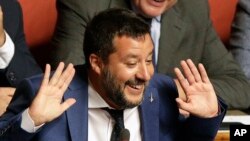Italy's center-left Democratic Party and the country's quirky anti-establishment Five Star Movement are exploring whether they can form a new government to spare Italians an election this year.
The one thing the two parties have in common is fear of Matteo Salvini, leader of the populist Lega Party, who hopes to sweep into power at the head of a far-right alliance in the event of a snap election he's engineering to happen.
Brussels is becoming increasingly unsettled at the prospect of a Salvini government emerging from Italy's political chaos, which was triggered this week when the unstable two-party coalition government formed just a year ago between the Lega and the Five Star Movement (M5S) formally collapsed amid acrimony and recriminations.
Salvini yanked his party out of the coalition government earlier this month, hoping he could ride his rising popularity to capture the prime ministership and seize what he termed "full powers."
Outgoing Prime Minister Giuseppe Conte, who resigned Tuesday in a rowdy parliamentary session, blamed Salvini for the unraveling of the short-lived, troubled government, accusing him of plotting to bring down the coalition, riding roughshod over his partners in government and showing disrespect for a "culture of rules."
He also criticized Salvini for mixing political slogans with religious symbolism, prompting the Lega leader to retort that he wasn't ashamed of his religious faith or for having invoked the protection of the Immaculate Heart of the Madonna.
Italian President Sergio Mattarella is now consulting with the various squabbling parliamentary parties to see if a working majority can be formed to avoid fresh elections and to bring some respite to the political drama.
Italy's president also has the option of appointing a government of technocrats, as was formed in 2011 in the wake of the Italian debt crisis. Mattarella has let it be known that he'd prefer to stave off an election until next year in order for parliament to agree on a budget, a process that normally takes three months.
Focus on longer term
But the 78-year-old head of state has also made it clear he doesn't want yet another short-lived government. The only real possibility for a new government lies with a tie-up between the Democrats (PD) and M5S.
But many analysts are skeptical that the two parties can overcome their differences, and if so, for how long, despite their shared interest in halting the momentum of Salvini. The outgoing interior minister and the country's most popular politician, Salvini has been building electorally thanks partly to his adeptness in dominating news cycles.
M5S, founded by the popular comic and blogger Beppo Grillo, built much of its success at the expense of the PD and has focused especially on the traditional strongholds of the left in the country's so-called Red Belt across central Italy and in the south. The party has gone out of its way to humiliate the PD, linking it tirelessly to corruption and cronyism and accusing it of being out of touch with the working class.
A coalition between the two would be yet another oddball alliance paralyzed by internal disputes, warn analysts. While the PD is pro-European Union, M5S is skeptical and at one time wanted to ditch the euro currency.
PD leader Nicola Zingaretti has voiced considerable skepticism about a tie-up, saying in a television interview Wednesday, "Discontinuity applies to personnel, as well as content."
But on Thursday, he left the door open, saying the archrivals could see eye to eye on issues of social justice and immigration. M5S has often been at odds with Salvini's tough anti-migrant polices, which have helped boost the Lega's electoral appeal.
After meeting Mattarella on Thursday, Zingaretti said he was willing to explore forming a new coalition government but "not at any cost." He told reporters it was a gamble.
"We need a government that changes direction, an alternative to the right, with a new, solid program, a broad base in parliament which gives back hope to Italians." If the gamble fails, "the natural way out of the crisis is new, early elections," he added.
Warning from Berlusconi
The proposal for a possible coalition government has been rejected by former Conservative Prime Minister Silvio Berlusconi, who also met with Mattarella. The center-right leader, whose political star has waned as Salvini's has risen, warned against "an improvised majority that exists only in parliament and not in the country."
Italian publisher and commentator Alberto Castelvecchi believes Zingaretti and M5S leader Luigi Di Maio will cobble together some kind of government, saying the prospect of a snap election was receding. But Castelvecchi said this would just be a delay.
"The question is not if we go to elections, but when and how," he said.
Meanwhile, Salvini and his lieutenants are laying the groundwork for a national poll, one they intend to fight on an uncompromising "Italy First" agenda that will challenge the EU's financial rules the Lega leader says are too restrictive.
Midweek, one of Salvini's advisers, Claudio Borghi, raised the prospect of a Lega-led government dumping the euro, calling it "the wrong currency for Italy."
He added, "It has impeded Italy's growth, puts us at a competitive disadvantage and deprives the country of the freedom to choose our own fiscal policies."






